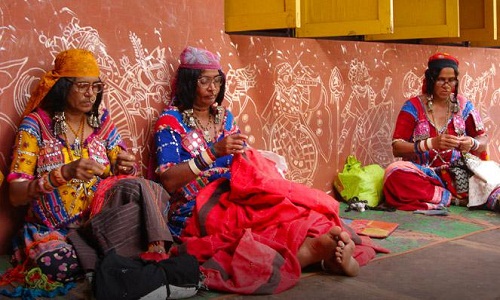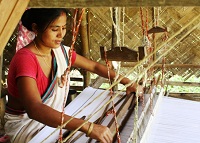"If export promotion councils start promoting Indian artisans on the global map with a strong push, then their growth can get a big boost. Delhi, Jaipur, or Lucknow’s local cloth and garment markets are always teeming with Europeans in search of unique Indian designs. Many are entrepreneurs bulk-buying cloth and dress materials, fashion accessories, and furnishings for resale in Europe, at a substantial profit."
If export promotion councils start promoting Indian artisans on the global map with a strong push, then their growth can get a big boost. Delhi, Jaipur, or Lucknow’s local cloth and garment markets are always teeming with Europeans in search of unique Indian designs. Many are entrepreneurs bulk-buying cloth and dress materials, fashion accessories, and furnishings for resale in Europe, at a substantial profit. The high costs of doing organised business and that too abroad has challenged the possibilities of artisans and clearly an opportunity is missed to create thousands of sustainable livelihoods that could go a long way in reducing poverty.
A big market waiting to be tapped

Statistics show that the rough size of this market is between $600 to $800 billion. If India’s artisans could capture even a tenth of this market and extract a fair value from it say 50 per cent of the final price of the product as opposed to the current 5-10 per cent, it would result in $30 billion of new exports and around six million sustainable livelihoods. In fact, many ‘global’ lifestyle brands from Switzerland or Scandinavia started out as small enterprises which creatively used product differentiation to climb the value chain.
Empowering the inherent creativity of artisanal genius would be a real example of grassroots ‘startup’ India. Indian foreign trade policy needs to work its way to promote such talent globally. We do not have any comprehensive scheme that actually helps the unorganised and small producers to export. Since the focus of foreign trade policy is to give small fiscal ‘incentives’ to different categories of exported products, it just equalises differences in cost and productivity vis-à-vis India’s competition.
A ‘startup’ exporter needs an all-encompassing support. They need to be made aware about consumer trends and product differentiation. For instance, using filigree silver to make high-end mobile-phone covers. They need access to low-cost production centres that help with standardisation and packaging. Support on omni-channel marketing to final consumers using social media and e-commerce market places and logistics would be another key area of intervention. Access to credit and formal banking channels is also the need of the hour. These are all pre-export requirements. How does a post-export incentive actually help competitiveness or bring those who are not competent and require hand-holding into play?
Learning from the best in class
A new foreign trade policy could target artisanal entrepreneurship as the first step in developing a new structure for incentivising exports from India, one that helps startups and innovation, and extracts maximum value from global value chains, taking cue from global best practices. Sweden’s export credit guarantee institution provides support with market intelligence and product placement to SMEs. A new MoU between DHL and International Trade Centre helps African SME exporters with e-commerce product placement and logistics.
A more radical model is HAX, a support and consultancy service for hardware startups that leverages the low-cost manufacturing cluster of Shenzhen to help develop and place products for global entrepreneurs. The pay-off for HAX depends on the success of the entrepreneurs they support, and thus they have a full stake in ensuring the success of the end product. HAX project teams handhold the startup right from the product conceptualisation stage to the final product placement. HAX represents a disruptive change in how a small manufacturer with the right product idea can crack the global market with very little financial resources.
So is it possible to replicate such model for Indian artisans? The pay-offs to the council would be tied to the export success of startup clients, and the councils would be expected to hire private sector expertise in areas ranging from product conceptualisation and design, to placement and logistics. The board of the council would have representation from both artisans and the venture capital industry. Salaries would be incentive-based, and the direct result of the export success of startups that the particular set of employees helped incubate.
This could start it as a pilot project. Assume the ministry of commerce working actively to create an artisanal ‘startup’ hub in Jaipur with significant seed funding, reaching out to India’s artisan groups and connecting them with a well-developed, expert venture capital community. An active participation from global logistics companies and e-commerce marketplaces through strategic tie-ups such as the one between DHL and International Trade Centre would add to the growth. In five years, we could create six million good jobs and our cities can truly become the luxury capital of the world.













